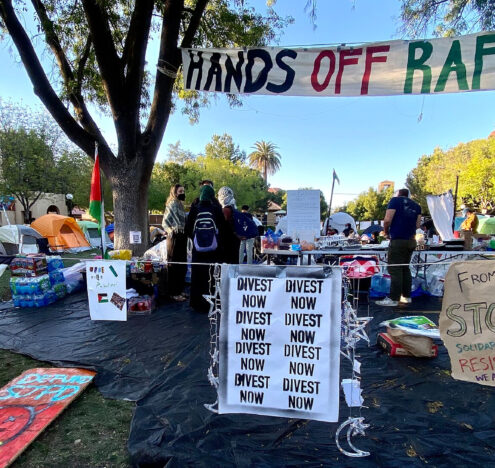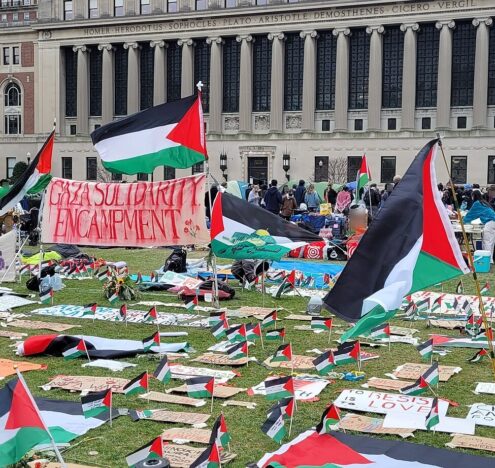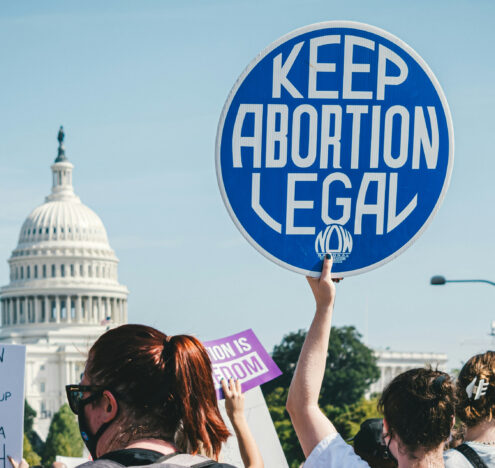As the 28th Conference of Parties (COP28) in Dubai begins to come to a close, it is now time to ask whether the United Nations’ (UN) annual talks adequately addressed some of the most significant drivers of climate catastrophe: militaries and armed conflicts.
The United Arab Emirates (UAE) was already a controversial choice as a host due to leaked documents purporting that the petro-state would use the conference to make fossil fuel deals with other participants, but the meetings went ahead as scheduled.
At past COP gatherings, military emissions have gone largely undiscussed, despite the fact that militaries as a whole contribute 5.5% of the world’s greenhouse gas (GHG) emissions.
This year, however, there was an event centered around the war in Ukraine and the toll it has taken on the environment. But is opening a conversation about how bombs and warplanes impact the world enough?
Militarized Responses
On Dec. 3, the UN unveiled the Declaration on Climate, Relief, Recovery, and Peace. Signed by 74 countries and 43 international organizations, this document is largely centered around climate financing for fragile, conflict-affected communities, or those in the midst of humanitarian crises. It may not directly address military or conflict-related emissions, but it does represent an important step forward in terms of financing sustainable peacebuilding and development, and repairing the environment after war.
Additionally, North Atlantic Treaty Organization Secretary General Jens Stoltenberg spoke at the conference to underline the alliance’s commitment to fight climate change. While it is a welcome sentiment that militaries want to play a part in combating this critical issue, a militarized response to it would not solve anything. If other countries’ militarized responses have shown anything, it is that their original mandates of curbing climate change have only fueled further instability and violence.
There were also a few side events at the conference. A Dec. 4 event, co-sponsored by the Conflict and Environment Observatory (CEOBS), outlined the extent of damage to the environment wrought since the onset of the war in Ukraine. This event also highlighted the lack of emissions reporting by the world’s militaries. This is only the second such side event that directly calls out this gap in emissions reporting, and the imperative to begin documenting it.
If other countries’ militarized responses have shown anything, it is that their original mandates of curbing climate change have only fueled further instability and violence.
Another event, this one regarding youth and climate action, directly called out military spending, and the need for greater sustainability financing. Speaker Yasmine Sherif stated, “[I]f we took 5% of military expenditures and moved them towards education and to address the climate crisis … We would have $100 billion a year to address climate change. So, the message is that you need to start reprioritizing.”
Lastly, there has been an eye towards Israel’s ongoing war in the Gaza Strip, and the environmental damage of that conflict: torched olive tree orchards, contaminated water supplies and devastated agricultural lands. The Secretary-General of the International Federation of Red Cross and Red Crescent Societies Jagan Chapagain has warned that the Gaza war has the potential to “become an environmental catastrophe.” Many climate activists at the conference linked the war in Gaza to climate justice for vulnerable communities, who are often the ones most at risk of suffering due to climate-related catastrophes.
Falling Short
Despite delegates to COP28 putting forth a draft agreement to phase out fossil fuels (after the conference president inaccurately claimed there was “no science” to support doing so), the current iteration does not specifically target militaries. Nor does it require them to report such usage. The agreement includes specific language that calls for conflict-sensitive approaches to mitigating loss, but, so far at least, nothing about military or conflict emissions themselves.
Delegates here seem more concerned with post-conflict sustainability and peacebuilding, rather than lowering GHG emissions or fossil fuel usage in wartime. This is not the correct way to go about discussing a climate-forward approach to peace. It is undoubtedly important to ensure sustainable post-conflict peacebuilding, but it is equally crucial to understand and mitigate the emissions and environmental damage that comes from conflict in the first place.
Meanwhile, many oil and gas corporations have pledged to cut methane emissions from pipeline leaks. Still, military usage yet again went unmentioned, as did the potential destruction of pipelines or refineries during wartime. This is a crucial step in terms of fighting climate change — methane is an incredibly potent greenhouse gas — but it does not go nearly far enough. UN Secretary-General Antonio Guterres said as much in his remarks on Dec. 3, when he pointed out that “the promises made clearly fall short of what is required.”
These cuts will likely affect militaries and conflict-affected areas as they rely on oil and gas for many functions, but their lack of participation in these talks remains telling.
Demilitarization
COP28 has started to show signs that it is willing to address the challenges posed by military and conflict-related emissions, but this is only the first step down a long road. Their inclusion in discussions has largely been relegated to side events, while it is imperative that they be part of the main conference.
Because militaries account for such a comparably large share of global emissions, they must be part of the solution — a solution that does not use force. These emissions can be cut through other means, the most important of which is demilitarization.
This aspect of fighting climate change has yet to fully be discussed at a COP, and such talks could not be needed more than they are now. Baby steps towards climate action will not be enough to ensure 1.5 degrees Celsius above pre-industrial levels of warming. Only bold action — action that takes on armed conflict and militaries the world over — can get us where we need to be.





















